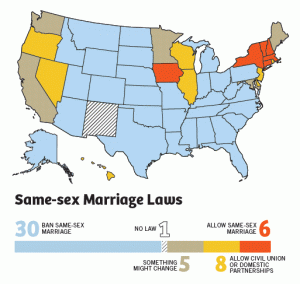
Uruguay's congress is considering a gay marriage law that would give same-sex couples all the same rights and responsibilities of heterosexual married couples.
The country already has a civil unions law and has stood out in Latin America lately for legalizing abortion and planning to sell government-grown marijuana to any citizen who wants it.
The proposed "marriage equality" law would change Uruguay's nearly-century-old civil code and give married gays and lesbians all the rights and responsibilities of heterosexual married couples, including the possibility of adopting children.
... Uruguay's Roman Catholic Church is opposed.
Bishop Jaime Fuentes, who presides over family issues for the church's governing episcopal conference, told the AP Wednesday that "marriage equality" is a discriminatory misnomer.
"It seems logical that two people of the same sex who care for each other and want to share their lives together can have some sort of civil acknowledgement, but it can't be the same as what governs marriage," Fuentes said. "Giving this kind of union the same obligations and rights as marriage would represent serious discrimination against a married man and woman."
The bishop argued that "children have a right to be raised by a father and mother, by birth or adoption."

 But bosses at Trafford Housing Trust, near Manchester, took action against Mr Smith saying the comments amounted to ‘gross misconduct’ and could bring the Trust into disrepute.
But bosses at Trafford Housing Trust, near Manchester, took action against Mr Smith saying the comments amounted to ‘gross misconduct’ and could bring the Trust into disrepute. Gay-marriage advocates, coming off their first ballot-box victories, are targeting New Jersey and five other U.S. states where the road to legalization is simpler because voters can’t overturn laws through referendums.
Gay-marriage advocates, coming off their first ballot-box victories, are targeting New Jersey and five other U.S. states where the road to legalization is simpler because voters can’t overturn laws through referendums.


 In the United States, some of the referendums held on the same day as the presidential elections in various States have, for the first time, delivered an outcome favourable to same-sex marriages. It is therefore clear that in western countries there is a widespread tendency to modify the classic vision of marriage between a man and woman, or rather to try to give it up, erasing its specific and privileged legal recognition compared to other forms of union.
In the United States, some of the referendums held on the same day as the presidential elections in various States have, for the first time, delivered an outcome favourable to same-sex marriages. It is therefore clear that in western countries there is a widespread tendency to modify the classic vision of marriage between a man and woman, or rather to try to give it up, erasing its specific and privileged legal recognition compared to other forms of union.
 "My heart sank when I learned that a movement to legalize recognition of same-sex marriage is gaining steam. I voted against the amendment, feeling that we should not deny state protections to same-sex couples, especially financial and health protections. At the same time, using the term "marriage" is so emotionally laden that it begs to be fought long and hard by those whose view is "traditional." Can we not just agree to provide legal protections to same-sex couples without calling it marriage? I believe there is enough support within the state that this could be accomplished without the amount of bloodshed we saw this last election. What do you think, Minnesota? Can we all agree to civil unions, and let the emotions have a chance to heal?"
"My heart sank when I learned that a movement to legalize recognition of same-sex marriage is gaining steam. I voted against the amendment, feeling that we should not deny state protections to same-sex couples, especially financial and health protections. At the same time, using the term "marriage" is so emotionally laden that it begs to be fought long and hard by those whose view is "traditional." Can we not just agree to provide legal protections to same-sex couples without calling it marriage? I believe there is enough support within the state that this could be accomplished without the amount of bloodshed we saw this last election. What do you think, Minnesota? Can we all agree to civil unions, and let the emotions have a chance to heal?"







